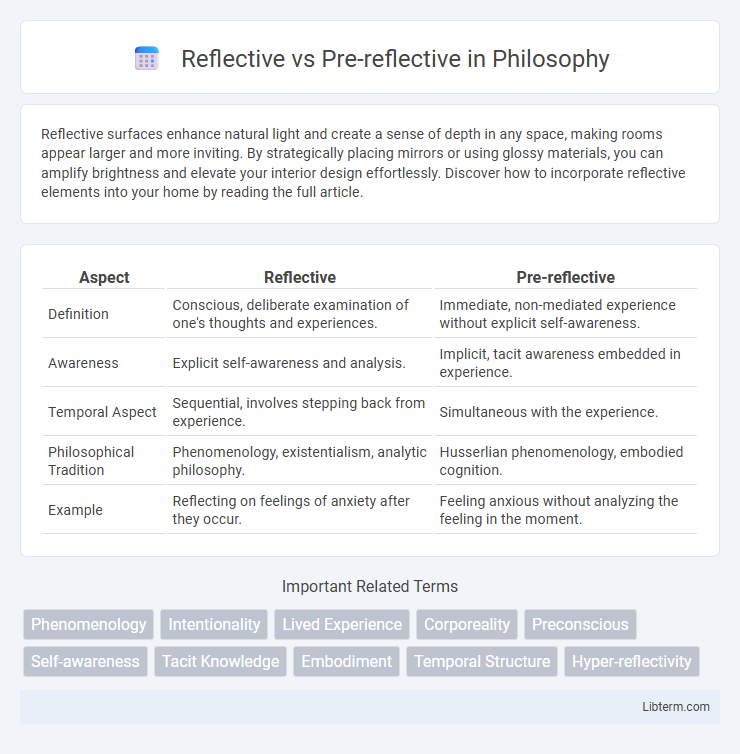Reflective surfaces enhance natural light and create a sense of depth in any space, making rooms appear larger and more inviting. By strategically placing mirrors or using glossy materials, you can amplify brightness and elevate your interior design effortlessly. Discover how to incorporate reflective elements into your home by reading the full article.
Table of Comparison
| Aspect | Reflective | Pre-reflective |
|---|---|---|
| Definition | Conscious, deliberate examination of one's thoughts and experiences. | Immediate, non-mediated experience without explicit self-awareness. |
| Awareness | Explicit self-awareness and analysis. | Implicit, tacit awareness embedded in experience. |
| Temporal Aspect | Sequential, involves stepping back from experience. | Simultaneous with the experience. |
| Philosophical Tradition | Phenomenology, existentialism, analytic philosophy. | Husserlian phenomenology, embodied cognition. |
| Example | Reflecting on feelings of anxiety after they occur. | Feeling anxious without analyzing the feeling in the moment. |
Understanding Reflective and Pre-reflective Awareness
Reflective awareness involves deliberate, conscious thinking about one's experiences, allowing for analysis, evaluation, and self-reflection. Pre-reflective awareness occurs automatically and non-conceptually, providing immediate, lived experience without explicit reflection or judgment. Distinguishing between these two levels of awareness enhances understanding of human cognition and phenomenology in fields such as psychology and philosophy.
Key Differences Between Reflective and Pre-reflective Experience
Reflective experience involves conscious self-awareness and deliberate analysis of one's thoughts and actions, enabling critical evaluation and meaning-making. Pre-reflective experience occurs at a tacit, immediate level where awareness is implicit, focusing on direct engagement without explicit self-examination. Key differences include the presence of metacognition in reflective experience versus the automatic, unmediated nature of pre-reflective experience.
The Role of Reflection in Consciousness
Reflection in consciousness involves the active process of deliberately examining one's own thoughts and experiences, distinguishing it from pre-reflective awareness that operates automatically and without focused attention. Reflective consciousness enables complex cognitive functions such as self-awareness, decision-making, and problem-solving by bringing mental states into explicit awareness. Pre-reflective consciousness provides the foundational, immediate experience of being aware, while reflection adds layers of interpretation and meaning critical for higher-order cognition.
Pre-reflective Awareness: Features and Functions
Pre-reflective awareness is characterized by an implicit, non-conceptual form of consciousness that occurs prior to deliberate reflection, allowing individuals to experience phenomena directly without self-objectification. This mode of awareness functions as the fundamental background of lived experience, facilitating immediate perception and embodied engagement with the environment. Key features include its non-thetic nature, temporal immediacy, and seamless integration with sensorimotor activities, underpinning subjectivity without explicit self-reflection.
Philosophical Foundations of Reflective and Pre-reflective Thought
Reflective thought involves conscious analysis and critical evaluation of experiences, grounded in the philosophical traditions of phenomenology and epistemology, particularly the works of Edmund Husserl and Donald Schon. Pre-reflective thought, by contrast, occurs at a tacit, immediate level of awareness without explicit self-examination, influenced by Heidegger's concept of "being-in-the-world" and Merleau-Ponty's exploration of embodied consciousness. The delineation between these modes is crucial for understanding the foundations of self-awareness, intentionality, and the structure of human experience in philosophy.
Reflective Thinking in Everyday Life
Reflective thinking involves actively analyzing and evaluating one's own thoughts, actions, and experiences to gain deeper understanding and improvement. In everyday life, this process enables individuals to make deliberate decisions, solve problems effectively, and learn from past experiences. Pre-reflective awareness, in contrast, is more automatic and immediate, lacking the conscious critical assessment that characterizes reflective thinking.
Pre-reflective Awareness in Phenomenology
Pre-reflective awareness in phenomenology refers to the immediate, non-thematic consciousness experienced before any reflective thought or explicit focus occurs, constituting the foundational layer of lived experience. This mode of awareness emphasizes the direct, tacit engagement with phenomena, where objects are encountered without deliberate analysis or conceptualization. Phenomenologists like Husserl and Merleau-Ponty highlight pre-reflective awareness as essential for understanding subjectivity and intentionality, contrasting it with reflective awareness that involves self-monitoring and abstraction.
How Reflective and Pre-reflective Processes Shape Self-Identity
Reflective processes involve conscious self-examination and critical analysis of experiences, shaping self-identity through deliberate evaluation and judgment. Pre-reflective processes operate at a more fundamental, immediate level, constituting the implicit sense of self grounded in lived bodily experience without conscious deliberation. Together, these processes intertwine to form a coherent self-identity, where pre-reflective awareness provides a foundational sense of being and reflective thought refines personal meaning and self-concept.
Applications in Psychology and Cognitive Science
Reflective cognition involves deliberate and conscious thought processes used in problem-solving and decision-making, while pre-reflective cognition operates through automatic, non-conscious awareness essential for everyday functioning. In psychology and cognitive science, this distinction aids in understanding disorders like schizophrenia, where disruptions in pre-reflective self-awareness impact reality perception, and informs therapeutic approaches that enhance reflective capacities to improve mental health. Research on learned behaviors and skill acquisition also leverages these concepts to optimize interventions by targeting either conscious reflection or automatic cognitive processes.
Implications for Personal Growth and Mindfulness
The distinction between reflective and pre-reflective awareness significantly influences personal growth and mindfulness practices. Reflective awareness involves deliberate, conscious examination of experiences, fostering deep self-understanding and intentional behavior change. In contrast, pre-reflective awareness offers immediate, non-judgmental presence that enhances mindfulness by grounding individuals in the present moment without conceptual distraction.
Reflective Infographic

 libterm.com
libterm.com